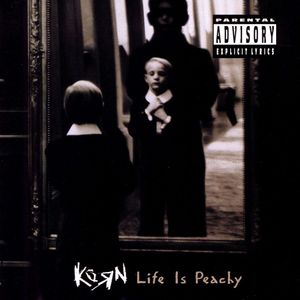
Korn - Top 10 Songs
Listen on Spotify
Korn: Pioneers of Nu Metal Fury
Korn, known for their distinctive, stylized name "KoЯn," exploded onto the music scene from Bakersfield, California in 1993, becoming the undisputed pioneers of the nu metal genre.
Born from the ashes of L.A.P.D., the band's core lineup features founding members:
- Jonathan Davis: The haunting, guttural vocals that define Korn's sound.
- James "Munky" Shaffer: Mastermind behind the band's signature riffs and powerful guitar work.
- Reginald "Fieldy" Arvizu: Laying down the heavy foundation with his ferocious bass lines.
- Brian "Head" Welch: Adding another layer of sonic aggression with his distinctive guitar style.
After Ray Luzier replaced founding drummer David Silveria in 2007, the band's current lineup is solidified, delivering a relentless, raw energy that continues to captivate audiences.
Their debut album, aptly titled "Korn," dropped in 1994, laying the groundwork for the band's rise to fame. "Life Is Peachy," their 1996 masterpiece, cemented their place in the music world, but it was "Follow the Leader" and "Issues" (released in 1998 and 1999 respectively) that catapulted them to mainstream success. Both albums stormed the charts, hitting number one on the Billboard 200, solidifying their dominance over the nu metal scene.
The band's reign continued with the release of "Untouchables" (2002), "Take a Look in the Mirror" (2003), and "See You on the Other Side" (2005), consistently delivering heavy, thought-provoking music that resonated with fans worldwide.
"Greatest Hits Vol. 1," released in 2004, served as a testament to their decade-long reign, marking the end of their contract with Immortal Records and Epic Records. They later signed with Virgin Records, releasing "See You on the Other Side" and an untitled album in 2007, further proving their endurance and artistic evolution.
Korn, the band that redefined heavy music, continues to be a force to be reckoned with, influencing generations of artists and leaving an indelible mark on the music industry. Their legacy as pioneers of nu metal will forever be etched in the annals of rock history.
These 10 Korn anthems embody the band’s dark riffs and raw emotion, showcasing Jonathan Davis’s intense vocals and boundary-pushing style that shaped nu-metal.
Selection Criteria
These songs were selected based on cultural impact, musical innovation, streaming popularity, and their significance in the band's discography.
The Top 3
Did My Time
Take a Look in the Mirror • 2003Part of the Take a Look in the Mirror era, “Did My Time” emerged as a single tied to the Tomb Raider: The Cradle of Life movie soundtrack. With scathing riffs and pounding drums, the song speaks to the frustration of feeling trapped in a cycle of mistakes and regrets. Jonathan Davis’s guttural pleas and melodic choruses capture the torment of repeated failures. The track’s tight structure—filled with memorable guitar hooks and dynamic shifts—demonstrates Korn’s ability to refine their sound without losing the dark, angst-ridden core that fans love. It’s a testament to their staying power in a music scene that was rapidly shifting.
A.D.I.D.A.S.
Life Is Peachy • 1996From their sophomore album Life Is Peachy, “A.D.I.D.A.S.”—an acronym standing for “All Day I Dream About Sex”—showcases Korn’s provocative edge. Beneath the controversial title is a track exploring obsession, desire, and the human psyche’s darker corners. Sonically, the song is driven by Fieldy’s distinct bass clicks, Munky and Head’s down-tuned guitars, and Davis’s raw vocal performance. Despite the risqué concept, the track underscores how Korn’s unfiltered approach set them apart in the mid-90s metal scene. It’s bold, brash, and unafraid to tackle taboo topics—qualities that endeared Korn to fans craving authenticity.
Coming Undone
See You on the Other Side • 2005Featured on the album See You on the Other Side, “Coming Undone” merges a tribal drum intro with a stomping metal riff, underlining the band’s continuous evolution. The song centers on the feeling of being on the brink—held together by a thread that’s rapidly unraveling. Jonathan Davis’s vocal delivery alternates between subdued tension and explosive release, encapsulating the mental strain of losing control. Its memorable chorus and chanting bridge make it a staple of Korn’s live shows, proving the band could still deliver anthems that resonate with fans old and new.
Honorable Mentions
Make Me Bad
From Issues, “Make Me Bad” highlights Korn’s knack for marrying heavy grooves with melodic hooks. The main riff is simple yet immensely catchy, creating a backbone for Jonathan Davis’s anguished vocals. Lyrically, it deals with the confusion of wanting something destructive and the guilt that accompanies it—a tug-of-war between pleasure and self-preservation. The track’s layered production adds depth, enveloping the listener in a swirling emotional haze. By combining raw power with radio-friendly accessibility, “Make Me Bad” extended Korn’s reach beyond the boundaries of heavy music.
Shoots and Ladders
“Shoots and Ladders” off Korn’s debut album blends heavy riffs with an eerie twist: the use of bagpipes performed by Jonathan Davis. Layering nursery rhymes over aggressive guitar lines, the track explores how seemingly innocent childhood lullabies can mask darker themes. This unique juxtaposition sets a haunting mood, reflecting Davis’s own experiences and traumas. Its experimental nature was groundbreaking in the metal genre, illustrating Korn’s willingness to take creative risks. The result is a song that’s both unsettling and oddly captivating—an early testament to Korn’s ability to push boundaries while staying unflinchingly honest.
Here to Stay
Leading off Untouchables, “Here to Stay” is a punishing onslaught of down-tuned guitars and pounding drums. Lyrically, the track channels anger at a world that constantly disappoints and alienates. Davis’s guttural roars and moody verses capture a sense of relentless, suffocating frustration. The production, helmed by Michael Beinhorn, gave Korn a crisp yet massive sound that elevated their heaviness without sacrificing clarity. The Grammy Award-winning track became a declaration of the band’s evolution—proving that even as nu-metal’s heyday was fading, Korn was determined to remain a force in the rock scene.
Got the Life
Also featured on Follow the Leader, “Got the Life” is a dynamic fusion of funk-like basslines, bouncing rhythms, and metal intensity. It showcases Fieldy’s signature bass slaps and a danceable groove unusual for rock tracks of that era. Despite the upbeat tempo, the song’s lyrics criticize materialism and question the emptiness of superficial success. Jonathan Davis’s delivery—ranging from melodic lines to enraged yells—drives home the contrast between shiny exteriors and underlying discontent. “Got the Life” became one of the first heavy rock songs to break into MTV’s mainstream rotation, marking a pivotal moment in Korn’s crossover appeal.
Falling Away from Me
Released as the lead single from Issues, “Falling Away from Me” tackles the sensitive topic of abuse and personal struggle. The haunting guitar melody and drum-driven buildup create an atmosphere of tension that mirrors the track’s dark subject matter. Jonathan Davis’s vocal performance oscillates between fragile vulnerability and explosive anger—capturing the emotional rollercoaster of someone trapped in a harmful situation. Musically, it’s a testament to Korn’s ability to write heavy riffs that still carry melodic hooks. The accompanying music video, which deals with domestic violence, sparked important conversations among fans, demonstrating Korn’s power to blend heavy music with a potent message.
Freak on a Leash
Off their landmark album Follow the Leader, “Freak on a Leash” secured Korn’s mainstream breakthrough. The track combines a hip-hop-inflected groove with detuned, aggressive guitars, showcasing the band’s genre-blurring flair. Jonathan Davis’s scatting vocal breakdown—an inimitable mix of beatboxing and raw emotion—remains one of the song’s most iconic moments. Lyrically, it delves into feelings of exploitation and vulnerability, reflecting broader frustrations with societal norms. The music video’s bold animation and edgy style not only earned critical acclaim but also cemented Korn’s place in popular culture. Even decades later, “Freak on a Leash” stands as a quintessential nu-metal anthem.

Blind
“Blind” isn’t just a song; it’s the definitive introduction to Korn’s sound and style. As the opening track on their self-titled debut album, it kicks off with Fieldy’s rumbling bass and an ominous guitar build-up before Jonathan Davis famously shouts, “Are you ready?” That moment is a battle cry for the nu-metal movement. Lyrically, it deals with feelings of disconnection and frustration—emotions that resonated with a generation looking for something raw and authentic. The contrast between Davis’s anguished vocals and the down-tuned guitars became a blueprint for the band’s signature heaviness. “Blind” laid the groundwork for Korn’s career, establishing them as pioneers of a darker, more introspective take on metal.
Final Thoughts
This ranking represents the pinnacle of Korn - Top 10 Songs artistic achievement. Each song has earned its place through a combination of cultural impact, musical innovation, and enduring popularity.
Cultural Impact
Songs that shaped music history and influenced countless artists
Fan Favorites
Tracks with millions of streams and lasting popularity across generations
Watch Related Video
Last Updated: 2/20/2025






